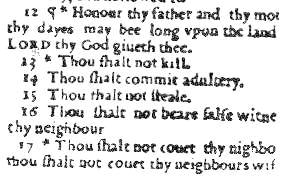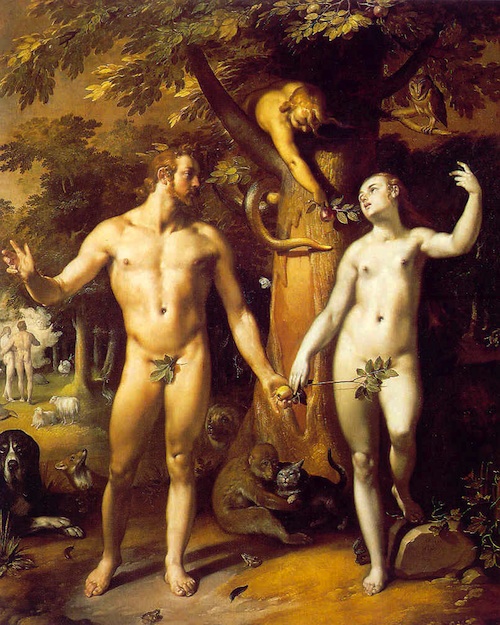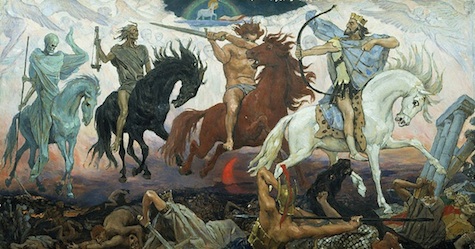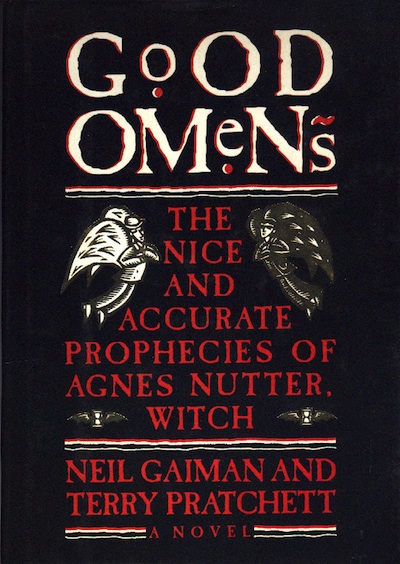There is some very interesting theological ground to cover where Good Omens is concerned, especially considering that the whole book is basically giving its own spin on the Book of Revelation. Truthfully, there is so much ground to cover that it didn’t fit in the Reference Guide. So without further ado, here are the items in the book that dealt with religions, mythologies, and rituals of all sorts….
Aziraphale:
- Aziraphale’s Name—has always been the cause of some dispute over the years in regard to pronunciation. (For the record, Pratchett has said that it was meant to be pronounced “Azz-ear-raf-AE-el,” but that he and Gaiman ended up pronouncing it “Azz-ear-raf-ail” over the years, so that’s what we’ve got now.) Terry Pratchett has said that while the name was invented, it fits into angelic “canon” as it were, which is true in more than one religion. Various faiths support angels with the names of Raphael, Mikhail, Gabriel, Azrael, and so forth, which phonetically falls in with Aziraphale.
- Principality—“Aziraphale was a Prinicipality, but people made jokes about that these days.” In Christianity, Principalities are said to be in the Third Angelic Sphere, below Seraphim, Cherubim, Ophanim, Dominions, Virtues, and Powers. They are meant to bring blessings to the material world and oversee groups of people. They are also said to educate and guard the Earth and inspire humanity. Considering how far humanity has come by the 20th century, it is not all that surprising that other angels make fun of Aziraphale’s job these days.
Bible(s):
-
 Infamous Bibles—Most of the bibles listed in Aziraphale’s collection do, in fact, exist, with the exception of the Charing Cross Bible and the Buggre Alle This Bible. Ones that are not mentioned include the Rebecca’s Camels Bible and the Ears to Ear Bible.
Infamous Bibles—Most of the bibles listed in Aziraphale’s collection do, in fact, exist, with the exception of the Charing Cross Bible and the Buggre Alle This Bible. Ones that are not mentioned include the Rebecca’s Camels Bible and the Ears to Ear Bible.
Christian Figures:
- Beelzebub—is Hell’s representative at Armageddon. Crowley gets cut off when he tries to introduce him as “Lord of the Flies,” likely because the current version of Beelzebub is a combination of two Biblical figures: Baalzebûb, Ekron’s god, who was called lord of the flies because he kept flies away from sacrifices, and Beelzeboul, an evil spirit who was known for instigating wars, getting demons worshipped, and bringing about murder and jealousy and the like.
-
 Brother Francis—Aziraphale’s agent sent to mentor Warlock is meant to be Saint Francis of Assisi. He is the patron saint of animals and the environment, which is why Warlock makes mention of his teaching respect for all living things, and why he is often covered in birds.
Brother Francis—Aziraphale’s agent sent to mentor Warlock is meant to be Saint Francis of Assisi. He is the patron saint of animals and the environment, which is why Warlock makes mention of his teaching respect for all living things, and why he is often covered in birds. - Gabriel—The archangel sounds like something of a bureaucrat in Heaven from the way Aziraphale seems keen to steer clear of his notice.
- Metatron—is Heaven’s representative at Armageddon, being the Voice of God (not the actual voice—he’s described as a “presidential spokesperson”). According to Rabbinic tradition, Metatron is the celestial scribe. It is said that he was Enoch, an ancestor of Noah, who became an angel.
Genesis:
- 4004 BC, October 23 at 9AM—is listed as an incorrect date for the beginning of the world. But even this date is cited falsely in Good Omens; the Archbishop who came up with it was named James Ussher (not Usher), and the work he wrote was titled Annales Veteris Testamenti (rather than Annales Veteris Et Novi Testamenti). Apparently, Ussher is frequently misquoted for the time of Earth’s creation—he suggested that it was at noon, not 9AM or PM. In other works, he gives an entirely different date of January 1, 4003 BC, at 6PM.
-
 Apples—Adam has a preoccupation with stealing apples from a neighbor’s tree. While this is the sort of behavior you would expect from a boy like him, it is also a call back to Adam eating the apple from the Tree of Knowledge in Eden.
Apples—Adam has a preoccupation with stealing apples from a neighbor’s tree. While this is the sort of behavior you would expect from a boy like him, it is also a call back to Adam eating the apple from the Tree of Knowledge in Eden. - Crawley—Crowley’s snake name from when he played the role of the Serpent in Eden. He retains snakeskin boots (that may not be boots) and snake eyes, which he hides behind sunglasses. Though some choose to view the Serpent of Eden as Satan, it is not until later points in the Bible that Satan is represented outright as a snake.
- Dog—Adam’s naming of his hellhound is meant to be reminiscent of the original Adam’s naming of all the animals on Earth. (Genesis 2:19)
- Flaming Sword—Aziraphale has a flaming sword that he gives to Adam and Eve after they are banished from Eden because they look cold. According to Genesis 3:24, the flaming sword was placed at the gates of Paradise after Adam and Eve’s expulsion as a way of preventing humans from returning. Clearly, this was not the case. Also, the Bible states that a Cherub is the one in possession of the sword at the Eastern Gate, not a Principality like Aziraphale.
- Wormwood—While this name suggested for Adam could have been in reference to The Screwtape Letters by C.S. Lewis, it could also be reference to the plant that rose up behind the serpent (Crowley, then Crawley) when it was cast out of Eden.
Mythology:
- Baron Saturday—Sergeant Shadwell says that Mister Rajit probably sacrifices chickens to him, meaning Baron Samedi, of course.

- Hellhounds—Dog is meant to be a hellhound, sent to be pet of the Antichrist. The appearance of hellhounds dates far back, however, and the Greek hound Cerberus (Kerberos) is perhaps the closest mythology comes to matching Dog and Adam’s relationship, as Cerberus was the dog of Hades, king of the Underworld.
- Nanny Astoreth—Crowley’s agent sent to be Warlock’s nanny is named for Ashtoreth, the Hebrew-ized name given to Astarte, otherwise known as Ishtar, the Mesopotamian goddess of sexuality, fertility, and war. In the Hebrew Bible, Ashtoreth is referred to as the Phoenician goddess tied to the power of nature. She sings Warlock a parody of the “Grand Old Duke of York” nursery rhyme.
- “Women wi’ too many arms”—Shadwell makes mention of them being witches, and is likely referring to the Hindu goddess Kali (and various other Hindu figures) without realizing it.
 Religious Rules and Sundry:
Religious Rules and Sundry:
- Book, Bell and Candle—Shadwell uses (nearly) these items to exorcise Azirphale. The book, bell, and candle are used when serious offenders are excommunicated from the Catholic Church.
- The Cabbala—Aziraphale has bits from the Cabbala on the floor surrounding a chalk circle that he uses to communicate with Heaven. Cabbalism is a system of thought developed by Rabbis in the Middle Ages, not a denomination.
- Compline—A religious time of day that Crowley confuses with Complan, a slimming aid. Compline is the final church service of the day, often set at 6PM.
- Seven Candles—Also used in Aziraphale’s attempt to call to heaven are seven candles. Seven is a very important number in Christianity, the number of perfection. God rested on the Seventh Day after He created the world. In addition, seven features very heavily in the Apocalypse; there are seven seals, seven churches, and seven bowls.
Revelations:
- Adam Young—Adam’s role as the Antichrist is given a very free interpretation in Good Omens, largely due to the fact that the Antichrist as a figure is relatively vague throughout the New Testament. The times that the term is used in the Bible is often for the purpose of marking a group of people rather than an individual, and some believed that the Antichrist would be Beast out of the Earth mentioned in Revelations. In addition, whatever the Antichrist’s role was intended to be during Armageddon was bound up in a fight against Christ and the army he led. It is possible that the reason we never see any of this is because Adam stops the whole circus before it ever gets that far. What is further fascinating is that it all lies within Adam’s power to stop in the first place, suggesting that either the prophecy of Revelations has to be completed in its entirety to move forward, or that the Antichrist has far more power in the process than the Book of Revelation suggests.

- Armageddon’s Location: The Four Horsepersons seem confused at first about where the Apocalypse is supposed to take place/begin. Some believe that the word that Armageddon comes from may have translated to “the mountain of Megiddo,” Mount Carmel, where the Carmelite religious order was founded, and possibly where Elijah proved that the one God was the deity of the Kingdom of Israel. This is mentioned again when Hell’s agents take Warlock to “the fields of Megiddo” and realize that he cannot be the Antichrist because he doesn’t know what to do there.
- Horsepersons—are the Four Horsemen of the Apocalypse in the Bible. They also have color-coded rides in Revelations: War is on a red horse, Famine on a black horse, and so on, reflecting the names the Horsepersons take in the story as well. Interestingly, however, the figure riding the white horse was typically thought to be “Conquest.” The change of this Horseman to Pestilence is recent and more common in pop culture.
- Kraken—Instead of the Antichrist being the Beast out of the Earth, Good Omens puts the Kraken to good use, there to get vengeance for all the sushi dinners of the world.
- “One third of the seas turning to blood”—Aziraphale suggests that this doesn’t have to happen to Metatron, referring specifically to Chapter 16 out of Revelations, dealing with the Seven Bowls.
- Pollution—The Horseman Pestilence is changed to Pollution for the purposes of this story. The suggestion is not that Pestilence has been usurped, but rather that he has morphed into Pollution as the problems of man changed over the course of time.
And there are likely so many more, so pile them on!
Emmet Asher-Perrin had a bird as a child named “Birdie Birdie.” It was not her idea, but she supposes she understands Adam’s impetus there. You can bug her on Twitter and read more of her work here and elsewhere.











That is interesting that Enoch became an angel. I have never heard that and it would be a demotion since God regarded man higher than the angels.
This is really interesting! I read this book in college and it amused me.
One thing:
“It is said that he was Enoch, an ancestor of Noah, who became an angel.” – now, my understanding may be incorrect, but from what I recall in Scripture, Enoch was assumed into Heaven (he didn’t die). But, at least in Catholic theology, this would not translate into becoming an angel, as we believe angels are completely different beings (beings of pure spirit, whereas humans are beings of spirit and matter). Humans do not become angels at death, it always sets my teeth just a bit on edge when, after some tragedy, Christians try and console one another with this idea of their children becoming sweet angels or the like. They become saints, but not angels. However, it is in poor taste to give a theology lesson during such a time so I hold my tongue.
Now, perhaps there is a different understanding of this in Judaism, so I’m wondering if there is some tradition elsewhere that talks of Enoch becoming an angel.
It’s not my religion, so I don’t have any dog in this fight, but the relevant book of the New Testament is “Revelation,” not “Revelations” — no final “s.”
I just want to say that Good Omens is my cousin Saskia’s favourite book, so much so that whenever she discovers a copy with a different cover she buys it anew. So far she has about seven copies (I gave her one of them) and I’ve just got her another (cover image Jonathan Ring).
She’s an avid reader (as am I) but this is the only book honoured so highly.
Bell, book, and candle were used for exorcism also. For example, in Marlowe’s Faustus, when Faust and Mephistopheles are in Rome doing mischief to the Pope, the Pope sends friars with bell, book, and candle to cast them out.
@5 – I loaned out my first paperback and never got it back. This makes me unhappy because it had a picture of Pratchett and Gaiman on the inside cover that I’ve not seen in any other paperback version I’ve ever seen since…
that should’ve been “@4” heh
I’m slightly confused about the naming of Aziraphale:
If the name is supposed to reflect classic angelic names like Gabriel, wouldn’t it need to read Aziraphael? That last syllable
-el is a reference to God, as far as I know, but -le wouldn’t work for that.
I think you missed the British in-joke about Principalities. It’s not other angels that are likely to make fun of Aziraphale’s job title, but people. Around London where he lives, they’re likely to answer “I’m a Principality” with “You mean like Wales?”
@David_Goldfarb – Thanks for that!
@torvald Nom – There has been some discussion over this that I know of, and so far no one seems to be able to come up with a reason for the ending being “le”. Something I’ll keep looking into!
@Del – Ah-ha, good point!
@Del: Ok, that’s a good one. That never crossed my mind as an American. I always interpreted that line as meaning that the Powers That Be thought Aziraphale did indeed make a mistake by giving away his flaming sword and demoted him from Cherub to Principality (the discrepancy Emily noted in the entry about the flaming sword), so it was indeed other angels laughing at him.
In your last point, you say
“The suggestion is not that Pestilence has been usurped, but rather that he has morphed into Pollution as the problems of man changed over the course of time.”
Except it’s explicitly stated that Pestilence was replaced/usurped by Pollution when he retired.
@3 carbonel
It is also now known as “The Book of the Apocalyse” in the Catholic Church, which I only mention because I quite like it.
@13: since apocalypse literally means revelation, and the Church likes its ancient language, this isn’t really surprising.
Many people, however, don’t know this, and think ‘apocalypse’ means ‘end of the world’. Dan Brown in The Lost Symbol correctly points out that ‘apocalypse’ means ‘revelation’ and not ‘end of the world’, but then messes things up completely by taking this to mean that ancient people were looking forward, not to the end of the world, but to a great revelation: whereas the truth is that the biblical Apocalypse is a revelation – they thought they had that already – but is about the end of the world. (There are, however, some books that can be called apocalypses which are about other things – the books of Enoch for example.)
This also leads to confusion over the four horsemen of the apocalypse – a phrase which really means the four horsemen from the book of Revelation, but is often taken to mean the four horsemen who will appear at the end of the world.
I believe “Wormwood” was the name of the star that fell from the skies and poisoned the land in Revelations. Gotta run so can’t look up the exact reference…
Can anyone shed some light on Famine’s reference to “wings of the storm” on page 310? Here’s the full quote:
“Look at it like this,” said Famine. “It’s just groundwork. We get to do the riding forth afterwards. The proper riding forth. Wings of the storm and so on. You’ve got to be flexible.”
Is the reference to Revelation, or possibly Ezekiel, or even Psalms? Or is it a source outside of the Bible?
If it was supposed to be pronounced ‘Aziraphael’, why didn’t they just spell it like that, which would have been consistent with such names as Raphael and Gabriel? ‘Aziraphale’ reads like a Greek name: Az-uh-ra-fuh-lee, and that’s how I always pronounced it in my head.
According to Wikipedia, the Archangel Raphael is called Israfil or Esrafil in Islam. (Note that there are aspects of Raphael and Uriel that get conflated & confused, this is also true for the interfaith dialogue.)
I attribute the “ale / el” confusion to a combination of factors:
1) the transliteration from Hebrew and/or Arabic letters to Roman, and
2) language translation, where sounds shift from one language to another.
A fan on Tumblr read “Raphael is the counterpart to Israfil” as evidence to support their “Crowley was Raphael before he fell” fan theory. I’m fairly certain that’s backwards, Aziraphale is Raphael in some form.
Raphael is an angel of healing. Israfal is an angel of music, who blows the trumpet at the apocalypse. I see both in the characterization of Aziraphale.
Another fan on Twitter suggested that Aziraphale may have been a cherub at the Eastern Gate, but was demoted to Principality later, possibly for giving the sword away. By extension, he could have been an Archangel that slipped to Cherub…
Brother Francis is not an “agent” of Aziraphale: he’s Aziraphale in disguise, just like Nanny Asthoreth is actually Crowley.
Re @17 : ‘He makes the clouds his chariot and rides on the wings of the wind’ Psalm 104:3?
Wormwood = ‘the name of the star is Wormwood. A third of the waters turned bitter, and many people died from the waters that had become bitter.‘ Rev 8:11
We don’t know what the fruit was in the garden of Eden. Here’s the interliner Chapter 3 of Genesis [https://biblehub.com/interlinear/genesis/3.htm]. Unless there are some expert Hebrew scholars who have other ideas….